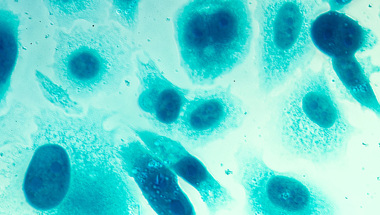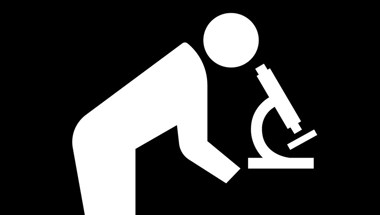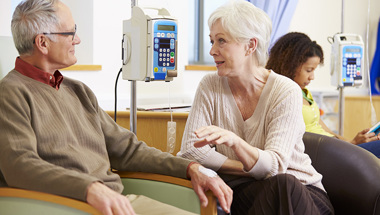
Developing new ways to prevent treatment resistance in prostate cancer

Grant information
Reference: MA-TIA23-001
Researchers: Professor Johann de Bono, Dr Alec Paschalis, Dr Adam Sharp
Institution: The Institute of Cancer Research, London
Award: £1,977,694
What you need to know
- Although today’s treatments for advanced prostate cancer can keep the disease under control for many years, over time these treatments become less effective, allowing the cancer to grow and spread once more.
- This research will target so-called ‘sleeper cells’ – cancer cells that survive treatment and slowly feed tumour growth – which potentially contribute to this treatment resistance.
- The researchers will test a new drug that aims to stop these sleeper cells. If successful, this could make current treatments more effective, leading to longer, better lives for men with advanced prostate cancer.
What will the researchers do?
Current treatments like chemotherapy, radiotherapy and hormone therapy can help manage prostate cancer, but they can leave behind some cancer cells that survive in a 'sleeping' state - not dead, but not growing either.
These ‘sleeper cells’ can pull in white blood cells – which would normally help to fight off cancer – to feed the cancer’s continued growth, block the immune system from killing the tumour, and even help the disease become resistant to treatment.
The research team aims to stop sleeper cells doing this, and so make prostate cancer respond to treatment again, with a clinical trial of a new drug.
The trial is based on previous work where the researchers discovered two critical ‘switches' on the white blood cells that are hijacked by cancer cells. These switches help pull the white blood cells into the tumour, to support cancer growth and make it harder for existing treatments to work.
With this information, the team will utilise a new drug, dubbed SX-682, designed to block both switches from being activated. This drug aims to prevent the white blood cells from being attracted to the tumour, effectively cutting off a key support system for the cancer cells.
This clinical trial will test the new drug on men with advanced prostate cancer.
Firstly, the team will ensure the new drug doesn’t cause significant side effects, maintaining the participants’ quality of life as much as possible.
Next, at the point when a man's current hormone therapy stops working, he will be given the new drug to see if it can stop his white blood cells from entering the tumour and halt the cancer’s growth.
Then, the researchers will use blood tests and biopsies of the cancer cells to monitor how well the drug is working and identify which men benefit the most from this treatment.
By the end of the trial, the researchers hope to show that this approach can clear the cancer of these supportive white blood cells and reverse the resistance that prostate cancer cells have developed, improving the effectiveness of hormone therapies and also chemotherapy.
All patients with advanced prostate cancer eventually develop resistance to currently available treatments. Consequently, prostate cancer remains a leading cause of male cancer death worldwide. With the award of this grant, supported by Prostate Cancer UK, we will build on our previous discoveries about how cancer cells and our immune system interact, leading to treatment resistance and cancer progression. In doing so, we aim to establish new ways to overcome resistance to treatment and develop new, better and kinder, treatments that improve outcomes for patients with lethal prostate cancer.
How will this benefit men?
If successful, this approach could transform how we treat advanced prostate cancer by making existing therapies more durable and effective.
In the long run, the research could lead to more personalised treatment plans, where doctors can identify which men will benefit most from this new strategy. This could not only save and extend the lives of men with advanced prostate cancer, but also significantly improve their quality of life.
How to get involved with this trial
This trial is looking for men to take part. You can read the information below to see if you may be suitable to take part in this study, and contact your medical team for full details on whether you can take part.
If you’d like support with deciding whether taking part in a clinical trial is right for you, you can speak to your medical team or contact our Specialist Nurses on 0800 074 8383 for general information and support.
Every clinical trial has specific criteria that everyone who goes onto the trial has to meet. These are called inclusion and exclusion criteria. This is to ensure the safety of people taking part in a trial and to ensure there’s some consistency to make the trial as accurate as possible.
We’ve listed some of the criteria about who can and can’t go onto the trial. Some of this you will know yourself, but some involve tests or complex medical information that your hospital team would be able to guide you on. Some of the tests aren’t done until after you’ve signed up to the trial for consideration.
Who can take part
You may be able to take part in this study if all these apply to you:
- You’re aged 18 or older.
- You can give written informed consent to take part after a discussion about the trial and reading written information.
- You're at 0, 1 or 2 on the Eastern Cooperative Oncology Group (ECOG) performance status scale. This means that you can manage your daily self-care activities (such as washing and dressing) yourself, and spend less than half the day using a wheelchair or in bed.
- Your PSA level is at least 10 ng/ml.
- A biopsy shows you have the most common kind of prostate cancer, called adenocarcinoma of the prostate. This can be confirmed by your healthcare team.
- Your cancer has spread to other parts of your body and no longer responds to hormone therapy (this is called metastatic castration-resistant prostate cancer).
- The trial team has confirmed that your prostate cancer is still growing or spreading.
- You’ve previously had either enzalutamide, apalutamide or darolutamide for at least 12 weeks, but it’s stopped controlling the cancer. If you’re accepted onto the trial and you’ve had abiraterone but not one of these other types of new generation hormone therapies, you’ll be given apalutamide and then moved onto the combination of treatments being tested if your cancer stops responding to abiraterone.
- You’re on ADT/ standard hormone therapy, or have had an orchidectomy (your testicles removed) and your Testosterone level is less than 50ng/dL (less than 1.7 nM)
- You’re able to swallow the medication.
- You’re willing to use contraception during sex for the duration of the trial, and for six months after your last treatment dose.
- You’re not receiving a steroid treatment, or are on no more than twice daily 5mg prednisolone (or equivalent).
- It’s possible to biopsy your cancer, and you’re willing to undergo a biopsy both before and after treatment.
- Within seven days before starting on the trial your blood test results are within certain ranges that your oncology team will check.
Who can’t take part
You would not be able to take part if any of these apply to you:
- You can’t agree to the requirements of the trial and the follow-up.
- You currently have COVID-19, or symptoms of COVID-19.
- You currently have non-infectious pneumonitis, or have previously had non-infectious pneumonitis that needed to be treated with steroids.
- You currently have another active illness or infection that could put you at risk.
- You have a weakened immune system.
- You have an autoimmune condition that means you need to take corticosteroid therapy.
- You’re intolerant to apalutamide, SX-682 (the treatment being tested), or to any of the parts that make up those drugs.
- You’ve previously had a severe reaction to a medicine. This could include conditions called Steven-Johnson's syndrome, toxic epidermal necrolysis, or drug reaction with eosinophilia and systemic symptoms (DRESS).
- You're still experiencing significant side effects caused by your previous cancer treatment, except for alopecia (hair loss) and minor nerve damage (grade 1 peripheral neuropathy).
- You have a condition that might mean you can’t absorb the treatments being given in this trial (for example, malabsorption syndrome).
- More than 20 per cent of your prostate cancer cells are neuroendocrine prostate cancer or small cell prostate cancer. Your doctors will know this from your biopsy results.
- You’ve had some types of radiotherapy within two to four weeks of joining the trial. Your doctors would be able to guide you if you’ve had radiotherapy within this time.
- In the four weeks before joining the trial, you’ve had surgery, chemotherapy or any other treatment for your prostate cancer that isn't mentioned in the ‘Who can take part’ list above.
- In the four weeks before joining the trial, you’ve taken part in a clinical trial of another treatment that's not yet been licensed for use. You may still be able to take part if you've been on a trial of a treatment that is already licensed for use, as long as it isn’t one of the treatments listed below.
- You have a history of liver disease, for example hepatitis or cirrhosis, or current alcohol misuse.
- Your tests suggest you may have a condition called hyperaldosteronism (your body makes too much aldosterone) or hypopituitarism (your pituitary gland is underactive).
- You’ve had any other cancer in the last five years, except for a type of skin cancer called basal cell carcinoma that’s been managed with treatment (for example, surgically removed).
- In the 12 months before joining the trial, you’ve had a condition caused by a blood clot (such as deep-vein thrombosis or a pulmonary embolism).
- You have a history of seizures or have other conditions that could predispose you to seizures. This could include an underlying brain injury, a stroke, a brain tumour, a cancer that has spread to your brain, leptomeningeal disease, or alcoholism.
- You’re taking any of the following medicines:
- Aminophylline or theophylline
- Atypical antipsychotics (e.g. clozapine, olanzapine, risperidone, ziprasidone)
- Buproprion
- Lithium
- Meperidine or pethidine
- Phenothiazine antipsychotics (e.g. chlorpromazine, mesoridazine, thioridazine)
- Tricyclic or tetracyclic antidepressants (e.g. amitriptyline, desipramine, doxepin, imipramine, maprotiline, mirtazapine)
- Warfarin or coumarin-like anticoagulants (blood thinners).
- You have any of the following cardiovascular conditions. Your team will also check you haven't got any problems with your heart that would make it unsafe for you to take part in the trial and will ask you about your previous medical history:
- In the six months before joining the trial, you’ve had a coronary artery bypass, angioplasty, vascular stent, myocardial infarction, angina, congestive heart failure or transient ischaemic attack.
- Untreated low blood pressure (systolic blood pressure less than 90mmHg).
- High blood pressure that is still high even with treatment.
- You have – or test results suggest you have – any other condition that means you shouldn’t take part in the trial or take a new treatment. For example, a condition that could put you at risk from taking the treatments being tested on the trial, or that could affect the results of the trial.
For full inclusion and exclusion criteria speak to your medical team.
Where the trial is taking place
- The Royal Marsden, Sutton, Surrey
Please be aware that more sites will be opening across the UK in due course.
Visit our clinical trials map for our interactive map of trials funded by us.
Speak to your medical team for the most up to date information on prostate cancer studies you may be eligible for.
For a general discussion about clinical trials, you may like to talk to our Specialist Nurses.
Help us fund more research like this
Your donation helps us fund lifesaving research into better treatments for prostate cancer.





